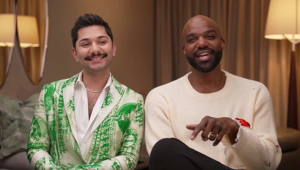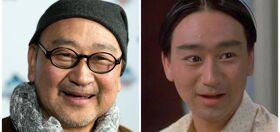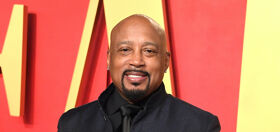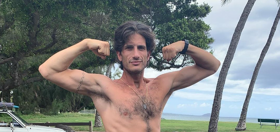
Gaetan Dugas was not just an early victim of HIV: He was the victim of an epic false accusation.
As a flight attendant in the late ’70s and early ’80s, Dugas flew all over the world with a free love attitude of no strings attached sex before succumbing to the disease in 1984. That might have concluded his sad died-to-young story, as it ended for far too many young gay men of his era.
But then along came Randy Shilts‘ epic chronicle of the AIDS crisis And the Band Played On in 1987. With zero evidence, Shilts claimed Dugas may have also knowingly infected hundreds of other men with HIV. As such, Shilts labels Dugas “Patient Zero” of the AIDS crisis, a false and sensationalistic moniker that helped propel the book to best-seller status.
Now director Laurie Lynd wants to end the Patient Zero myth once and for all.
How about we take this to the next level?
Our newsletter is like a refreshing cocktail (or mocktail) of LGBTQ+ entertainment and pop culture, served up with a side of eye-candy.
A native of Canada, Lynd earned wide acclaim and notice after the release of his short RSVP in 1992. Writer B. Ruby Rich named Lynd one of the key directors of the New Queer Cinema movement, which helped launch him onto a long career as a filmmaker.
Having directed feature films like Breakfast With Scott and dozens of television episodes of shows like Queer as Folk, Noah’s Ark, and Schitt’s Creek, Lynd’s new documentary Killing Patient Zero seeks to torpedo the Patient Zero myth. Featuring interviews with friends of Dugas, queer writers, historians, and CDC officials who attempted to confront the AIDS crisis, Lynd’s fascinating movie argues that the Patient Zero myth arose out of innuendo and simple mistakes. It also proves that Dugas could not have been the actual Patient Zero as it attempts to vindicate his name.
Queerty managed to get a first look at Killing Patient Zero literally just minutes after Lynd finished his final edit of the film. We also scored a few minutes to chat with Lynd himself.
Killing Patient Zero will have its world premiere on April 26 at the HotDocs Film Festival in Toronto. Additional screenings on April 27 and May 6 will follow, and a theatrical release is pending.
This is your first feature film in more than 10 years, and it’s your first documentary. Were you nervous about coming back to either format?
Frankly, about features, I was relieved. It’s so hard to get independent films made now, I think almost worse in Canada than in the states. I’ve had a lot of projects that haven’t come to fruition, which is so frustrating. And some gay-themed projects too. I still think there’s a lot of homophobia in the entertainment business in terms of what gets made.
Related: Director Dan Krauss on AIDS doc ‘5B’: “History is, in a very frightening way, repeating itself.”
So I only felt relief, and it’s a total thrill to have a feature again. In terms of documentary, I was daunted. I have done docudrama TV work, so I’ve interviewed people on camera before. I actually really enjoyed that in the past, so I was really looking forward to this. It’s such an intimate, trusting thing when you’re interviewing someone, particularly on camera, because I could cut that footage any which way. It was daunting too, to go back to the AIDS years. I turn 60 this year, so I lived through them amazingly unscathed. Personally, I lost friends and boyfriends. It was harrowing to go back to that time, and it was, I think, for my subjects as well.
Harrowing how?
I knew I was gay when I was five. I didn’t know the word for it, but when I was playing with my Mary Poppins doll…
[Laughter]
You know, I had parents that bought my Mary Poppins doll when I was five in 1964. Anyway, I’ve been officially out since I was 19, and I’ve always made gay films when I’ve been able to. I lived in New York at the height of the AIDS crisis. I was in the NYU grad film program from 1982-86. The thing that struck me when I was making this film was how much I had blinkers on then.
How so?
It’s interesting, my boyfriend Eric and I have talked about how we both kind of got through those years by a kind of willful blindness—that amazing thing we can do with our minds where we know something but don’t know it. The irony for me of coming at this project which is all built out of And the Band Played On is that when I was reading And the Band Played On in 1990—and I was back in Toronto—it woke me up politically. It opened my eyes. It motivated me to make my short film RSVP which was sort of a meditation on the grief I was feeling from losing people and the spectacular homophobia that had been in play.
The thing I’m embarrassed to admit—but that’s worth admitting—is that when I read that book in 1990 I bought the Patient Zero story. I wasn’t smart enough to question it. So it was a wonderful opportunity to go back to And the Band Played On and look more closely at how Randy Shilts wrote Patient Zero. And as you can tell from my film, I think there was a lot of internalized homophobia in the way Randy wrote it.
So when you read And the Band Played On that your first exposure to the myth of Patient Zero?
Yes it was. About 1990, that’s when I first heard of it.
How long did it take you to find people that knew Gaetan Dugas?
Well, we had a wonderful shortcut. The film is based on a wonderful book by Richard McKay called Patient Zero and the Making of the AIDS Epidemic. My producers did a lot of the leg work on finding people. There were a number—I’d say probably over half of the people we interviewed, are people McKay interviewed in the book. The main thing that I brought more of to the film—first, painting the picture of what it was like growing up gay, what the world was telling us, etc. But I tried to bring a really balanced picture of Randy into it as well.

In terms of your question though, it was kind of the wonderful thing of thinking, Who would I like to talk to. B. Ruby Rich is one of our strongest interviews. And then, of course, to get Fran Lebowitz was unbelievable. I had read her books in high school. I’ve always been a fan. The way that she talks about gay people—she has an interesting take. I’ve never heard anyone say before that we didn’t just lose all these artists, we lost a whole audience. It’s a very compelling statement. It was thrilling to meet her.
You dedicate your film to Gaetan and Randy Shilts. Randy, however, doesn’t come off great with his attitudes about Gaetan and the way he sensationalized the Patient Zero myth. What was the overall feeling about him from those you interviewed?
It depends who you’re talking to. As you know Michael Denneny, his editor, bravely takes full blame for agreeing to the idea of using [the Patient Zero myth]. I love how Denneny refers to it as “cultural Judo” to use your opponent’s homophobia to promote your own important gay work. But one of the guiding principles for me in making this film is I didn’t want to blame anyone. I’m trying to capture, in the film, a sense of [the horror of living through the AIDS crisis], and how desperate people like Randy were to get AIDS on the national agenda. So I have a lot of admiration for Randy Shilts. I think he did the wrong thing for the right reason with the Patient Zero story. And interestingly, my next project is a film on Randy Shilts.
Oh really?
It totally came out of this because I felt like I couldn’t do justice to his whole life story and I want to because he is a controversial figure. He was a proponent of closing the bathhouses at the height of the AIDS crisis. People attacked him for that, called him anti-sex. People called him assimilationist and all these things. I think it’s easy to forget all the good he did.
Jumping to Gaetan, I almost feel as if I know Gaetan a little from making the film. I’ve come to admire him so much because of his bravery. I hope the film conveys that.
I got the impression that you see Gaetan as something of an unsung hero for the AIDS crisis. This is a man that was forthright about his status and who was indispensable in helping the CDC identify other men who were at risk. There’s still the question of if he knowingly infected people. One of your subjects talks about the nihilistic attitude of well, we’re all going to get it anyway, so what can you do? Was that also Gaetan’s view, a fatalistic approach?
It’s only speculation: No one will ever know for sure. But in meeting people who knew and loved him, and hearing the rumors, particularly in Vancouver—I think Randy picked up on rumors. I think the thing to remember is that when Gaetan was in Vancouver, he was probably the first case of [karposi sarcoma] anyone in that town had ever seen. This was 1982 when he moved there for a year. A lot of rumors arise out of that. My belief is that he honestly didn’t think he was infecting other people. He thought he had cancer.

It’s so important to remember that the virus itself wasn’t even announced publicly until after Gaetan’s death. I think we don’t know what we would have done in his situation. The other thing I really wanted to stress in the film is that this was happening eight or nine years after homosexuality was delisted as a mental illness. As one of my subjects says, “Doctors had always been trying to cure us.” So there was a very good reason to be mistrustful of what doctors were telling us. So I don’t blame him at all, and I love that the guy who slept with him, Russ Murray, says he never blamed him when he thought he might be HIV positive. You have to remember, nobody knew. It was all speculation. I can’t imagine anyone [knowingly infecting hundreds of people]. It’s just based on rumors and fear mongering.
You’re Canadian. In the US—and this does come up in your film—there is a feeling among the queer community that President Reagan allowed AIDS to happen, that he felt no remorse for the men who were dying and in fact, may have encouraged it. Is that feeling also prominent in other countries like Canada?
It’s definitely in Canada as well. Obviously, when the epidemic hit, it was in New York, San Francisco, and LA. It’s so interesting, I didn’t realize that in those first years, people in other countries in the world thought the disease started in America. I’d never heard that before. But Canada—we didn’t do much better. I wanted to keep it in the film, but I had to keep to a decent length. The health minister for British Columbia said to one of my subjects that when he saw the safe sex literature they were trying to create—this was in 83 & 84—that the health minister said he wouldn’t fund that “filth.” And the Premier of the province was proposing quarantine on an island! So we had our own share of that homophobia. Our Prime Minister at the time, Brian Mulroney, didn’t even said the word AIDS until 1990. That’s worse than Reagan.
That’s appalling.
That’s the most shocking thing in a way, isn’t it? I can’t believe it was so recent and there was such widespread, accepted homophobia. It’s still shocking even though I lived through it.
It’s hard for the community today, especially younger people, to understand just how decimated gay men were by AIDS. The treatment of AIDS is even more infuriating when you consider the hysteria over one reported case of the Zika virus, or Bird Flu or SARS, and how those get 24-hour news coverage. Thousands of people were dying of AIDS, and nobody seemed to care.
Yep. It’s also harder for young people to understand just how brave someone like Gaetan was to be openly gay. Because he always was, and that wasn’t common both then.

That raises the question of what the community would look like if we had two generations of activists, of mentors, of trailblazers alive to guide us. Where would we be today?
The voices we lost, it’s not unlike a war where you lose a whole generation of men. I’m sure there are leaders and people who could have made a difference in the world in those we lost.
In illuminating Gaetan’s story, what path forward, what wisdom, do you hope to bequeath to the community?
Gosh, that’s a good question. I think the most important thing is not to be complacent, how hard-won these rights are, and that we can lose them again if we’re not careful. In terms of Gaetan’s story in particular, I don’t know how to answer that. I don’t want people to celebrate this, but to me it’s a story of no good deed goes unpunished. Had he not been culpable, this wouldn’t have happened. His attitude, from what I can tell talking to his friends, was always cheerful. He believed he was going to beat this thing. I hope people see his courage.
You have a long and varied filmography, many of which touch on queer themes. Orson Welles used to say that an artist should have that one work, the one great thing that when he meets his maker he can say “I made this” as a ticket to heaven. Is this film that for you?
Wow. I think it might be. I do, actually, David, because—and I hope this doesn’t sound too pretentious—I hope it keeps me from becoming a footnote.
That doesn’t sound pretentious.
So I do think, out of the blue, this unlooked-for opportunity to make this film, I’m so thankful for. I do think it might be the thing I am remembered for.
Killing Patient Zero plays at HotDocs April 26, 27 and May 6.



















Doug
Wow, this looks like a fascinating documentary. I hope it gets a wide release.
oz1967
Could not agree more, looking forward to this.
Brian
It’s amazing how long lies persist. People think he was the instigator because of the number zero. Actually, it was an O – the letter O, an abbreviation for “outside” because he was from outside the research area.
In a world as stupid as this, it will take a lot to teach people the truth. A majority of Americans don’t “believe in” evolution. The president thinks climate change was invented by China. You want to teach people biology? Haha, good luck!
niles
Gaetan was no hero. I narrowly missed having sex with him. He would actually arrange with friends to have guys waiting for him at his various stops across the country, even after it became evident he was ill. I was overwhelmed at the time with a monumental feeling of sadness and dread and cancelled. My friend, Steven, was not so “lucky”.
AgainNagain
When I think of how promiscuous and how reckless gays in the 70s were, I just can’t help but feel so angry with them for spreading the fatal disease to the gay community in the US. How could anyone manage to have slept with hundreds of men and didn’t care? Sex addiction and porn addiction are so destructive for gay men and sadly it hasn’t changed so much since the 70s.
Juanjo
When Gaetan was alive no one knew what was making him sick. He didn’t either. As the interview says, he thought he had cancer. I remember back then there were a bunch of theories including one that using poppers was the cause, that one was popular even after the HIV virus was identified as the cause. In the early days, theories abounded about what it was making gay men get sick and die. Gaetan was certainly not Patient 0 nor did he knowingly spread the HIV virus. No one knew there was an HIV virus back then. There were people that argued for people to use protection when having sex but there were also people who attacked the idea of doing so, saying there was no evidence the disease resulted from sexual activity.
That was a horrible time for gay men and I lost virtually every friend I had from back then. I do not want to count the number of friends I helped take care of nor the number of funerals I went to when they died. I still remember the dread one felt when reading the BAR and looking at all the obituaries, wondering which names you would recognize. I do not blame Gaetan for anything he did. He was no different from many other gay men back then who unwittingly passed on the disease, not knowing that they had it.
LARRY
Juanjo I will give you a number…857. I worked in AIDS Respite Care end of the 80’s and really early 90/91 and I lost 857 clients. As to friends in addition I can’t. It was the most devastating experience and time of life I have ever endured. And AgainNagain I will not allow you to shame those who died. No one knew what the hell was going on and by the time we did millions were dead. You want to spread some shame do it somewhere else please. Talk about how that pos Reagan allowed so many to die without lifting a finger.
Rock-N-RollHS
Even if this little tale you tell is true, it’s an idiotic premise. In 1983 and 1984, gay people were still having unsafe sex because no one knew what was happening; few could imagine or face the potential horror that emerged. I wonder how many people “Steven” infected. It was just a luck of the draw who got it and who died. But you can blame others if it makes you feel superior.
Rock-N-RollHS
@ AgainNagain You’re an idiot.
DCguy
@AgainNagain
Sweetie, if you’re going to pretend not to be a right wing troll account, you may want to avoid using “Sex addiction” and “Porn Addiction”. Those are both the DANGERS the last Mormon leadership meetings were screaming about. Psychologists laugh at both, but right wing sites and anti-LGBT Mormon leaders continually talk about them.
You’re busted.
PinkoOfTheGange
@AgainNagain nothing worse than an unoriginal troll.
jimontp
@AgainNagain is a homophobic troll who can’t even get history right. The 70s were the first time in American history when gay men were free to meet in bars, bathhouses, square dances, choruses, sports leagues, and a myriad other places. So there was freedom to express all the aspects of gay life, and that included a sexual freedom only dreamt of when we were kids. There was NO recklessness. The first cases of what is now HIV were in 1981-2. If you want to be such an Evangelical about sex, that’s your choice, if you don’t like porn, just turn it off. Just don’t give us that crap about gay guys in the 70s knowingly spreading HIV. Go preach that at some more right wing site.
jimontp
The two things that struck me about the interview was when he said he was at NYU in 1982- 86 and he “sort of had blinkers on.” Just when the AIDS plague exploded in NY, he had blinkers on? Then when he said that he and and boyfriend Eric got through “those years with a sort of willfull blindness.” What the hell does that mean? When all my friends were dying of the same disease and my life was filled with caring for dying friends and memorials, I don’t get how removed from reality this guy and his boyfriend must have been. How can he now make a film about the horrors going all around him, when he had blinkers on to the reality?
niles
you’re being a bit judgemental, we all have survival mechanisms to keep going. it’s kind of like our current political situation – sometimes I have to turn it off for my own sanity. As for the sick troll above, may he rot in hell.
AgainNagain
II am stating a truth many old gays hate to admit. You lived a utterly promiscuous, irresponsible and reckless lifestyle back then and your sufferings are of your own making. You can deny it all you want but until you own it, you’re always going to blame others for your own misery.
Vince
The more you guys respond to the againnagain troll the more it enjoys it. Like a pig in slop. It will say anything for attention.
Hdtex
Manufactured huh? So tell that to the 100 plus friends and acquaintances of mine who died you festering pile of excrement.
Hdtex
AgainNagain, you really should consider committing a mercy killing. Yourself.
Rock-N-RollHS
@ AgainNagain. Oh you tragic little idiot. I’m sure, if you keep trying, SOMEONE will sleep with you. You’re only a little ugly.
[email protected]
i remember that article. I thought it was awful..that the hysteria just grabbed onto this story. and his parents seeing this